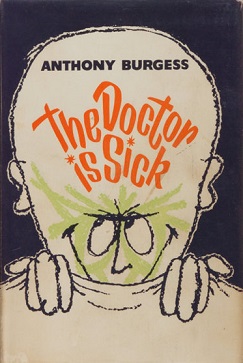This article has multiple issues. Please help improve it or discuss these issues on the talk page . (Learn how and when to remove these messages)
|
 First UK edition | |
| Author | Anthony Burgess |
|---|---|
| Language | English |
| Genre | Comic novel |
| Publisher | Heinemann (UK) W. W. Norton (US) |
Publication date | 1960 |
| Publication place | United Kingdom |
| Media type | |
| Pages | 261 pages |
The Doctor Is Sick is a 1960 novel by Anthony Burgess.
Contents
According to his autobiography, Burgess composed the book in just six weeks. He wrote it after his return to England from Brunei in a burst of literary activity that also produced Devil of a State , A Clockwork Orange , The Right to an Answer and several other works.